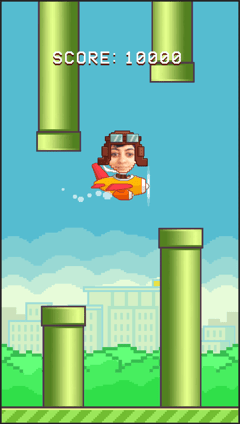What are filter games?
Face filter games are fun and easy one player augmented reality mobile games where users interact with the game-play using a face. The first game based AR filters appeared on Snapchat releasing Snappables AR selfie games back in 2018 and later, on Instagram.
Today, the Instagram game filters are still a novelty. Developing a custom AR filter for your brand is a great way to stand out. Brands and developers are adopting AR effects at a large scale to engage users and attract traffic organically via social media. With filter games, these goals are becoming much easier to achieve.
Advantages of AR selfie games:
- Fun and easy to use
- Higher engagement compared to static AR filters
- Interactivity and gamification provides increased user sessions
- Effective among kids and families playing together
- High probability of shares and virality due to its novelty

Most popular face games and how they work
1. Face Dance
The face dance game challenges the user to repeat the emotions displayed on the screen. These games use emotional expression recognition to track player’s mimic and match it with the task of the game. Once the right expression is detected, the game algorithm estimates the successful task completion and the user earns the points.
Banuba Face dance game demo
2. Face Runner
In the runner game, the user moves his or her face to control the character along the road, avoiding obstacles and collecting objects. The game uses face detection and tracking technology and recognizes head turn angles.
Banuba runner AR selfie game
3. Tic-tac-toe + AR Mask
We developed classic Tic-tac-toe game mechanics with several levels of AI difficulty, which learns to play better after your victories. The gameplay features the player in real-time and the AI counterpart. Once you win a round, you unlock a part of the AR filter. You can customize the UI and AR mask for a specific holiday like Halloween, Christmas, etc.
AI Tic tac toe and AR mask game demo
Of all AR selfie games, the Tic-tac-toe game appeared to be the most engaging one, especially for kids. It showed the highest session rates too. Unlike with the face dance challenge and runner, users feel comfortable playing the game in public places.
4. Trigger-based games
Filter demo: call effect with trigger Smile
Triggers are small scenarios enabled through user facial expressions. The player can interact with AR objects, call or modify face filters by opening their mouth, blinking, smiling, raising eyebrows or frowning. Triggers somewhat differ from emotion recognition and are applied for games where players swallow flying objects or blink to shoot.
5. Flappy Bird Style
The Flappy Bird game filter first appeared on Instagram and is now probably the most recognized AR selfie game out there. The player controls the flying bird with up-down head tits trying to avoid the obstacles.
 Flappy Bird featuring the player face inside the object
Flappy Bird featuring the player face inside the object
The original Instagram game filter features the face on the entire camera, but it can also be modified to cut and paste the player's face right into the "bird".
6. Touches + AR
Another type of face game is touch-based AR filters. Players can feel comfortable using the filter in public places and control the object using swipes. In the example below, we modified the Runner game, so that the user needn't use his face to control the character. Instead, the player uses old-familiar swipes. The AR mask and live selfie camera add engagement to the gameplay making it player-focused.
Demo of touch-based game control + AR filter
7. Face + AR Mask
Face filter games are not necessarily built with user emotion or facial expressions. You can just add a player's face on the screen and overlay an AR mask that will add vibes to your game.
 Players can take a selfie and share on social networks.
Players can take a selfie and share on social networks.
The players will still use the smartphone front camera to play while the AR selfie experience stimulates interaction, selfie making and shares to social networks. Yet, people don't have to look for a quiet place to enjoy the game. Once the game session is complete, the player can take a selfie and share on social networks.

How to develop a custom game with Face AR SDK
If you want to develop custom Instagram-like game filters and add them to your app, you can get started with our Face AR SDK.
1. Define game mechanics
Game filters involve 2 parts including the mechanics and graphical part. Based on the type of the game, you can either use our existing mechanics shown above or we can discuss custom face game development if you want something unique or similar to Snappables or other Instagram game filters.
2. Start SDK trial
Start your free trial and assess the face tracking and AR mask performance in your app. Get in touch with us via the website form.
3. Customize AR content and graphics
We pass you the prototype of the game and you add your AR content (masks, filters, virtual makeup, etc.). You can develop your creative AR filters and add them to your game.
4. Launch and iterate
Test how your game performs measuring user sessions, shares and involvement. Experiment with AR content and game mechanics to drive maximum engagement into your app.
Wand to develop a face filter game? Explore how to make your game stand our with Face AR SDK.
